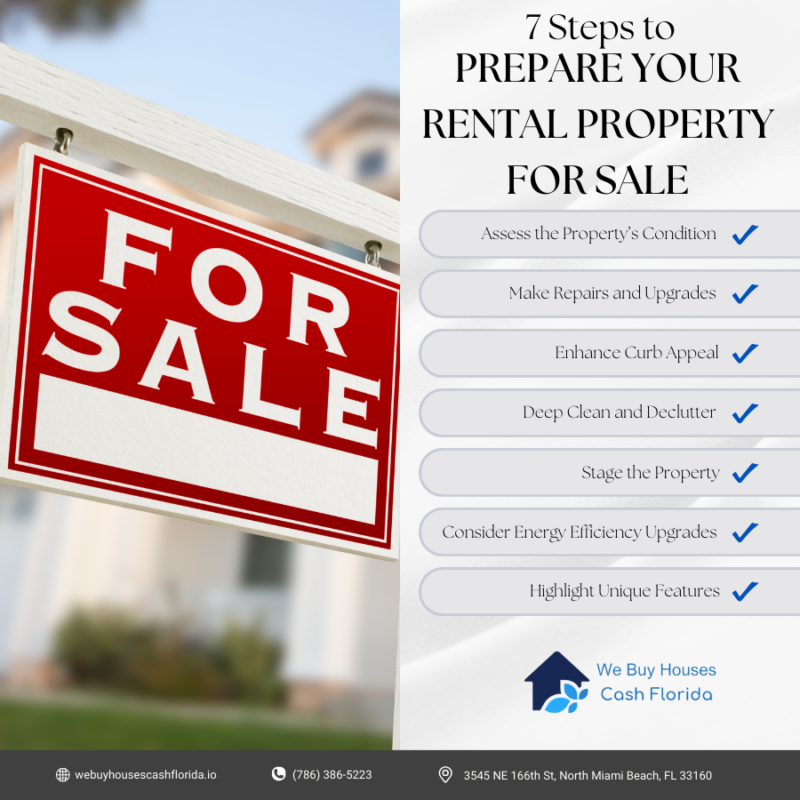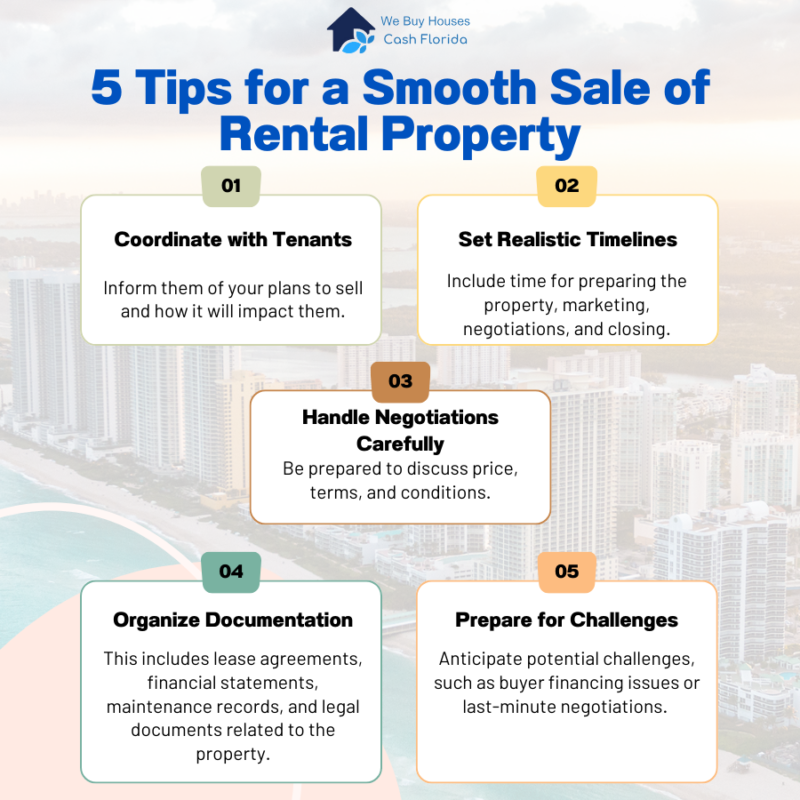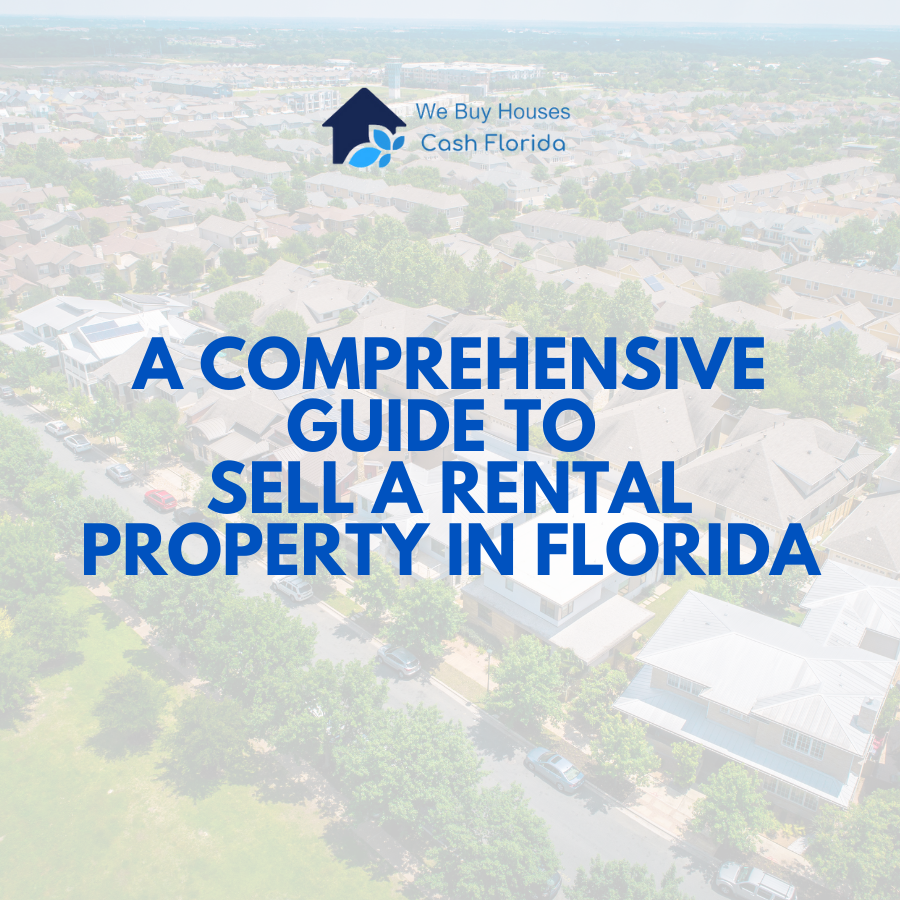Landlords choose to sell rental properties for various reasons, ranging from financial needs to market-driven decisions. Personal circumstances, such as retirement, relocation, or the need to liquidate assets, often drive these decisions. Reinvestment opportunities in more lucrative ventures, such as diversifying a real estate portfolio or investing in other markets, can also be compelling reasons to sell. Florida’s real estate market, especially in metropolitan areas like Miami, Tampa, and Orlando, has experienced significant growth. Rising property values and high demand make it an opportune time to sell. Below, I’m going to provide you with a detailed guide to selling rental property in Florida.
Assess Florida’s Market Conditions Before You Sell a Rental Property in Florida
Understanding market conditions is important for timing your property sale effectively. Florida’s real estate market is dynamic, influenced by various factors:
- Employment Rates: A strong job market attracts more residents, increasing housing demand.
- Population Growth: Florida’s growing population, driven by its appealing climate and no state income tax, boosts the housing market.
- Interest Rates: Lower mortgage rates make buying more affordable, leading to higher demand. Conversely, rising rates can cool the market.
Keeping an eye on key indicators like median home prices and average days on the market helps determine the best time to sell. In 2024, median sales prices have increased steadily, from $404,200 in January to $421,900 in April. Monitoring these trends provides insights into market dynamics and informs decisions on when to list your property.
Keep in mind, if you’re looking to sell a rental house in Florida, you’d look at the sales prices of homes. However, if you want to sell an apartment building or multifamily house, make sure to look at the right statistics and real estate comps.
Steps for Selling a Rental Property in Florida

To attract potential buyers and maximize your sale price, it’s important to make sure your rental property is in top condition. Here’s a detailed guide on preparing your property for the market:
1. Assess the Property’s Condition
Conduct a thorough inspection to identify areas needing repair or improvement. Focus on structural issues, plumbing, electrical systems, and HVAC units.
2. Make Necessary Repairs and Upgrades
Focus on high-return areas like kitchens and bathrooms. Modernize these spaces with new fixtures, countertops, and appliances to significantly boost your property’s appeal and value. Check and find out if all essential repairs, such as fixing leaks, broken windows, and malfunctioning systems, are addressed.
3. Enhance Curb Appeal
First impressions matter. Improve your property’s exterior with fresh paint, landscaping, and minor exterior improvements like repairing walkways or updating the front door. A well-maintained lawn, trimmed bushes, and colorful flowers can make your property more inviting.
4. Deep Clean and Declutter
Make sure the property is spotless and free of clutter. A clean, well-organized space looks more spacious and appealing to buyers. Consider hiring professional cleaners for a thorough job.
5. Stage the Property
Staging helps potential buyers envision themselves living in the space. Arrange furniture to highlight the property’s best features and create a welcoming atmosphere. Professional staging can make a significant difference in how quickly and profitably your property sells.
6. Consider Energy Efficiency Upgrades
Invest in energy-efficient upgrades like LED lighting, modern insulation, or energy-efficient windows. These improvements can make your property more attractive to environmentally conscious buyers and can be a selling point that sets your property apart.
7. Highlight Unique Features
If your property has unique features, such as a swimming pool, outdoor kitchen, or proximity to local amenities, make sure to highlight these in your listing. Unique features can attract more interest and justify a higher asking price.
Understanding Tenant Rights When Selling a Rental Property in Florida
When selling a rental property with tenants in place, you need to understand their rights and the legal considerations involved. Here are the key points to consider:
Review Lease Agreements
Start by reviewing the existing lease agreements. Determine if the leases are month-to-month or fixed-term. Month-to-month leases offer more flexibility for ending the tenancy, while fixed-term leases typically require honoring the lease until it expires.
Legal Obligations
Understand your legal obligations as a landlord. In Florida, you are required to provide adequate notice before showing the property to potential buyers. The standard notice period is 24 hours, but it’s best to check local regulations for any specific requirements.
Tenant Communication
Clear communication with your tenants about the sale process and timelines is crucial. Inform them about your intention to sell and how it may affect their tenancy. Transparency helps build trust and facilitates cooperation during showings and inspections.
Options for Tenants
Consider the following options when selling with tenants in place:
- Sell with Existing Leases: This option is appealing to investors looking for immediate rental income. Double check to see the leases are in good standing to attract potential buyers.
- Negotiate Early Lease Terminations: Offer tenants incentives to move out early if a buyer prefers a vacant property. This could include covering moving expenses or offering a reduced rent for the remaining lease term.
- Wait Until Leases Expire: If feasible, wait until the leases expire before listing the property. This can simplify the sale process and make the property more appealing to a broader range of buyers.
Rights and Protections
Tenants have rights that need to be respected throughout the sale process. Avoid any actions that could be perceived as harassment or violating their privacy. Make sure you follow legal protocols protects you from potential legal disputes.
Accurate Valuation: Pricing Your Rental Property Correctly
Of course when you’re selling a rental property in Florida, whether you want to sell a rental house or sell an apartment building—you want to get the best price for your property. Working in the real estate industry as long as I have, you learn a thing or two about getting the best valuations.
Here’s what I found out that everyone should do before selling rental property in Florida.
Professional Appraisal
Consider getting a professional appraisal to determine the property’s market value. An appraiser will provide a detailed report based on the property’s condition, location, and comparable sales in the area. This objective valuation can help you set a realistic asking price.
Market Analysis
Conduct a thorough market analysis to understand how similar properties are priced. Look at recent sales data for comparable properties in your neighborhood. Pay attention to properties with similar size, features, and rental income potential.
Income-Generating Potential
Evaluate the property’s income-generating potential. Calculate the current rental income and consider factors like occupancy rates and lease terms. Investors will be interested in the property’s cash flow and return on investment (ROI).
Comparable Properties
Compare your property with similar rental properties on the market. Look at the asking prices, conditions, and amenities of these properties. Understanding the competition can help you price your property competitively.
Adjust for Unique Features
Consider any unique features or upgrades your property has. Energy-efficient appliances, modern renovations, and additional amenities can justify a higher asking price. Highlight these features in your listing to attract buyers willing to pay a premium.
Stay Updated on Market Trends
Keep an eye on market trends and adjust your pricing strategy accordingly. Real estate markets can fluctuate based on economic conditions, interest rates, and local demand. Staying informed helps you make timely decisions and stay competitive.
Effective Marketing Strategies for Selling Rental Property Florida
Effective marketing is essential to attract potential buyers for your rental property. Highlight the investment potential and unique features to make your listing stand out. Here’s how I would do it if I were marketing a rental property:
Highlight Investment Potential
Emphasize the property’s rental income, occupancy rates, and neighborhood amenities. Potential buyers, especially investors, are interested in the property’s profitability and stability as a rental income source.
Professional Photography
Hire a professional photographer to take high-quality photos of your property. High-resolution images showcasing the property’s best features can significantly enhance your listing’s appeal. The photos must highlight key areas such as living spaces, kitchens, bathrooms, and exterior views.
Virtual Tours
Virtual tours provide an immersive experience for potential buyers. This is particularly important for out-of-town investors who may not be able to visit the property in person. A well-made virtual tour can give them a comprehensive view of the property and its layout.
Compelling Listing Descriptions
Write detailed and engaging descriptions that highlight the property’s features and benefits. Include information about recent upgrades, tenant amenities, and the local area. Use keywords like “high rental yield,” “prime location,” and “investment opportunity” to attract search traffic.
Leverage Online Platforms
List your property on multiple real estate platforms and social media channels. Utilize platforms like Zillow, Realtor.com, and local real estate sites. Social media advertising can target specific demographics and locations, increasing your listing’s visibility.
Highlight Neighborhood Benefits
Describe the benefits of the neighborhood, such as proximity to schools, public transportation, shopping centers, and parks. Mentioning nearby amenities can attract buyers interested in both investment and personal use.
Consider Selling Rental Property to Cash Buyers or Investors
One of the quickest ways to sell rental property in Florida is to sell to cash buyers, such as We Buy Houses Cash Florida. Companies that buy homes for cash over several unique benefits, such as streamlining the sale process and provide immediate liquidity.
The Benefits of Selling Rental Property in Florida to Cash Buyers
- Fast Transactions: One of the primary benefits of selling to cash buyers is the speed of the transaction. Unlike traditional sales, which can take several months, cash sales can close in as little as a week. This is particularly advantageous if you need to sell quickly due to financial pressures, relocation, or other urgent circumstances.
- Selling As-Is: Cash buyers typically purchase properties in their current condition, which means you don’t need to invest in repairs or upgrades before selling. This can save you time and money, especially if your property requires significant maintenance work. Cash buyers are often experienced investors who plan to renovate the property themselves.
- Simplified Process: The process of selling to cash buyers is straightforward and involves fewer complications. You typically receive a cash offer within 24 hours of expressing interest. After agreeing on the offer, the closing process is quick and involves less paperwork. There are no contingencies for financing, appraisals, or inspections, which are common in traditional sales.
- Fewer Fees: Selling to cash buyers often results in fewer fees. Traditional sales involve closing costs, real estate agent commissions, and other expenses that can add up. With a cash sale, many of these costs are reduced or eliminated, providing a higher net return.
- Reliability: Cash sales are generally more reliable. Traditional sales can fall through due to financing issues or buyer contingencies. With a cash buyer, you have the assurance that the sale will proceed as planned, providing peace of mind.
Now, as you look to sell your rental property, you’ll need to take the financials into account.
Financial Considerations When You Sell Rental Property Florida
Selling a rental property involves several financial implications that need careful consideration to maximize your profits and minimize liabilities. Here are the financial considerations you’ll want to take into account.
Capital Gains Tax for Selling a Rental Property in Florida
One of the most significant financial implications of selling a rental property is capital gains tax. This tax is calculated on the profit made from the sale of the property. Long-term capital gains tax rates apply if you’ve owned the property for more than a year, while short-term rates apply for less than a year. Consult with a tax professional to understand your specific tax liabilities and explore strategies to reduce them, such as utilizing a 1031 exchange to defer taxes by reinvesting in another property.
Depreciation Recapture
When selling a rental property, you must account for depreciation recapture. This is the IRS’s way of recouping the tax benefits you received from depreciating the property over the years. The recaptured amount is taxed at a higher rate, so it’s crucial to factor this into your financial planning.
Deductions and Expenses
Consider the potential deductions and expenses associated with the sale. These can include closing costs, real estate commissions, legal fees, and any improvements made to increase the property’s value. Properly documenting these expenses can reduce your taxable gain and save you money.
Impact on Cash Flow
Selling your rental property will affect your cash flow, especially if it has been a steady income source. Assess your financial situation to ensure you have a plan for replacing this income, whether through other investments or alternative revenue streams.
5 Tips for a Smooth Sale of Rental Property

From experience, there are some ways to make sure you have a smooth rental property sale. Here are the top 5 tips I’ve found that can help facilitate a successful transaction.
1. Coordinate with Tenants
Open communication with tenants is crucial. Inform them of your plans to sell and how it will impact them. Schedule showings and inspections at convenient times to minimize disruption. Offer incentives, like reduced rent, to gain their cooperation during the sale process. Keeping tenants in the loop about the timeline and any changes fosters a positive relationship and reduces potential conflicts.
2. Set Realistic Timelines
Creating a detailed timeline for each stage of the sale is vital. Include time for preparing the property, marketing, negotiations, and closing. Allocate extra time for unexpected delays or complications. Organized planning keeps the process on track and reduces stress. Collaborate with your real estate agent to complete all tasks promptly. A well-defined timeline also helps in coordinating with tenants and managing their expectations.
3. Handle Negotiations Carefully
Negotiations can be complex, especially with investment properties. Be prepared to discuss price, terms, and conditions. Understand your bottom line and remain flexible where possible. Approach negotiations with a willingness to compromise while keeping your objectives in mind. Working with a real estate agent or attorney experienced in investment properties provides valuable guidance. They can help you navigate the complexities of the negotiation process and secure the best possible deal.
4. Organize Documentation
Having clear, complete, and well-organized documentation is crucial. This includes lease agreements, financial statements, maintenance records, and legal documents related to the property. Providing organized and accessible records builds trust with potential buyers and speeds up the due diligence process. Have all necessary documents ready before listing the property to avoid delays. Detailed and transparent documentation can also help justify your asking price and highlight the property’s value.
5. Prepare for Challenges
Anticipate potential challenges, such as buyer financing issues or last-minute negotiations. Develop contingency plans for common problems that might arise during the sale process. Flexibility and adaptability are key to overcoming hurdles without derailing the sale. For instance, if a buyer’s financing falls through, have backup offers or alternative buyers in mind. Proactive preparation for various scenarios helps you navigate unexpected challenges smoothly and maintain momentum in the sale process.
Final Words: Sell Rental Property in Florida
Selling your rental property in Florida can be a lucrative decision when approached strategically. By understanding market trends, preparing your property, and leveraging professional help, you can maximize your return and ensure a smooth sale.
For a quick and hassle-free sale, consider We Buy Houses Cash Florida. Our team is available 24/7 to make an offer on your home as-is, providing a fast and convenient solution. For more information, visit We Buy Houses Cash Florida and get started today.
FAQs
How can I avoid a large tax bill when selling my rental property in Florida?
Consider using a 1031 Exchange to defer capital gains taxes. Named after Section 1031 of the Internal Revenue Code, this strategy allows you to reinvest the proceeds from your property sale into another investment property, thus deferring the capital gains taxes. The replacement property must be of equal or higher value, and you must identify it within 45 days and close within 180 days of selling your original property. This method is particularly useful for those looking to expand or diversify their real estate portfolio.
Another approach is converting your rental property into a primary residence. By living in the property for at least two of the five years before selling, you can qualify for an exclusion on capital gains taxes—up to $250,000 if single, or $500,000 if married filing jointly.
Finally, consider making tax-deductible repairs to the property. Repairs made to maintain the property’s condition, rather than to add value, can be deductible. This not only makes your property more appealing to buyers but also helps reduce your tax liability. Always consult a tax professional to explore these options and develop a strategy tailored to your financial situation.
What are the tax implications of selling my rental property?
When selling a rental property, you may face capital gains tax on the profit made from the sale. The rate depends on how long you’ve owned the property—long-term rates apply if owned for over a year, while short-term rates apply if owned for less than a year. Additionally, you may encounter depreciation recapture taxes. Consulting with a tax professional can help you navigate these liabilities and explore options like a 1031 Exchange to defer taxes by reinvesting in another property.
How do I handle tenants who refuse to cooperate during the sale process?
If tenants are uncooperative, start by addressing their concerns and offering incentives such as reduced rent or relocation assistance. If they still refuse to cooperate, review your lease agreement and Florida tenant laws for guidance. Legal actions may be necessary, but it’s best to resolve issues amicably to avoid delays. Communication and flexibility are key in managing tenant relations during the sale process.
Can I sell a rental property in Florida if it needs significant repairs?
Yes, you can sell your rental property even if it needs significant repairs. Consider selling to cash buyers or investors who are willing to purchase properties as-is. This can save you the time and cost of making repairs. Cash buyers typically offer a faster and more straightforward sale process, making it a viable option if you need to sell quickly or if the property requires extensive maintenance.
How does property management affect the sale of my rental property?
If your property is managed by a property management company, their role can significantly impact the sale process. Here’s how:
- Comprehensive Records: A property management company maintains detailed records of rental income, expenses, and maintenance. These records are crucial for potential buyers as they provide transparency and demonstrate the property’s financial health. Your property manager should be able to promptly provide these documents to facilitate the buyer’s due diligence process.
- Tenant Relations: The property manager’s relationship with tenants can influence the sale. Clear and effective communication from the property manager about the sale can help maintain tenant cooperation. This is especially important for scheduling showings and inspections. A cooperative tenant makes the process smoother for both the seller and the buyer.
- Maintenance and Upkeep: Regular maintenance and timely repairs managed by the property management company enhance the property’s appeal. A well-maintained property is more attractive to buyers and can justify a higher asking price. The property manager must continue to maintain the property during the sale process to avoid any deterioration in condition.
- Transition Assistance: A property management company can assist in transitioning the property to the new owner, especially if the buyer intends to keep it as a rental. They can help with lease transfers, tenant communications, and continuity of management services. This added layer of support can be a selling point for potential buyers.
- Market Insight: Property managers often have valuable insights into the local rental market. They can provide data on rental trends, tenant demand, and potential rental income. This information can be used to highlight the investment potential of your property, making it more appealing to prospective buyers.
What are the benefits of listing my rental property with a real estate agent?
Listing your rental property with a real estate agent brings several benefits, enhancing your chances of a successful sale. Real estate agents possess in-depth knowledge of the local market, including current trends, property values, and buyer preferences. They can accurately price your property based on a comparative market analysis. Consequently, they’ll make sure your property price remains competitive and attractive to buyers.
Agents utilize multiple platforms and professional networks to market your property. They have access to the Multiple Listing Service (MLS), real estate websites, and social media channels, broadening your property’s exposure. Professional marketing materials, such as high-quality photos and virtual tours, are often part of their service. Experienced agents are skilled negotiators. They represent your interests during negotiations, striving to secure the best possible price and terms. Their expertise helps navigate counteroffers, contingencies, and other negotiation complexities.
Real estate transactions involve extensive paperwork, including contracts, disclosures, and closing documents. Agents manage this paperwork, making sure all forms are correctly completed and submitted on time. This reduces the risk of legal issues and delays, providing a smoother transaction process. Selling a property requires significant time and effort. An agent handles the marketing, showings, communications, and negotiations, allowing you to focus on other priorities. Their professional support streamlines the entire process, making it less stressful for you.



